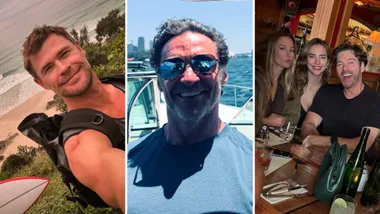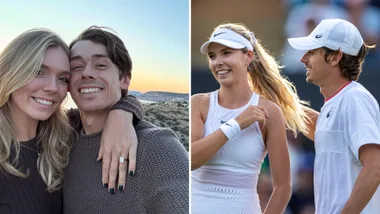Nick and Heather Gleeson have both been blind since childhood, but that has not stopped them striking out on their own, travelling the world and raising two children. Here, they share their remarkable story.
When I was seven, I was hit on the head by a door in the supermarket. It was a few days later that things became fuzzy.
I told my mother, “I can’t see you properly”, and she took me straight to the eye hospital. I looked through the window and the buildings got further and further away. Almost in desperation, I looked at my mother’s face and that’s the last thing I saw. Everything disappeared.
In pictures: Top Aussie inventions
I thought it was a normal thing to happen in families; my older brother had become blind two years earlier. He was running and collided with a student, which caused a retinal detachment — the same thing that happened to me.
The retina is like the mirror behind your eyes and when it lifts away, it can no longer reflect any images.
As a seven-year-old, you go with the moment. I got used to walking into things; you have to be rubberised. I went to a school for blind children and then to a regular high school, where I would be sent to the library when it was time for sport.
The kids would think I was so lucky, yet I used to love sport and wanted to do what they were doing, but couldn’t.
I went to Melbourne University and did a Bachelor of Arts. That was tough, too, as you’re changing rooms and classes all the time and there are different people in each lecture. Most people didn’t understand disability and were busy trying to cope with their own teenage or young adult lives. I was very socially isolated.
At parties, I realised my huge disadvantage. I was like any young guy — I wanted to meet women, but I couldn’t read body language. A lot of my friendships were formed on public transport; one of my best friends to this day is a woman I met on a tram.
One day, I was sitting on the sidelines at a goal ball game [a game for blind athletes] and got chatting to a girl named Heather. She was lively, she was good-looking and we just seemed to have chemistry. Things happened very quickly with us; it was not long until we were engaged.
Neither of us thought we’d marry someone who was blind, but the good thing is we both understand what’s involved. If a blind person marries someone who’s sighted, the general public thinks that person is their carer.
One of the great things about Heather is she’s never stopped me from doing the things I’ve loved in life, the adventures, like climbing to Everest Base Camp.
But when it came to having children, I was far more petrified than her. I was unsure whether we even should, but Heather never had doubts. She said we’d be fine and we were fine.
We just had sensible parental instinct and rules. You don’t have children in the kitchen. We closed doors to ensure we knew where they were. We used the playpen. We know people thought there would be accidents, but it worked out. There’s very little we haven’t been able to achieve by just doing it differently.
When our children were smaller, I remember feeling their faces when they were asleep and thinking, “How fantastic is this? How treasured are we to have these children of ours?” We’d ask people what they looked like, what colour eyes they have, what their skin looked like. We craved all that stuff.
Belinda was at pre-school when a child told her that her mother was blind. That night, we explained to Belinda that, yes, we were blind, “that’s why you put Daddy’s hand on the carport, that’s why you move us around things when we walk up the street”. She was doing it without even knowing.
Related: Blind boy can see ‘by talking like dolphin’
I think both our children probably grew up faster. Peter is such a boy and so rough and tough, yet would stop and tell Heather the colours of the flowers. He’d say, “Mummy, there’s a beautiful flower over here.” He knew Heather loved flowers.
I remember the first day I took Peter to play cricket. Peter went on the field for two hours and when he came back he said, “Dad, did you see the catch I took?” I said, “Pete, I did, you’re a champion.” I had to lie. I saw the president and said, “I really do need people to help me a bit, to explain what’s happening. I just need 10 minutes. It makes a big difference to me.”
Nick Gleeson is a community development officer with Vision Australia.
Read Heather’s part of this story in the May issue of The Australian Women’s Weekly.
Your say: What do you think the most challenging thing about losing your sight would be?

Video: Fred Hollows’ amazing legacy











